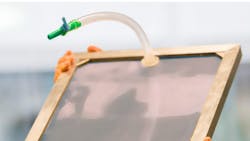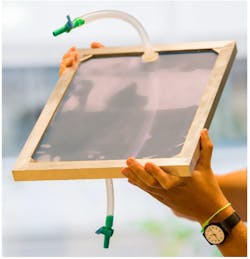Solar nanotechnology filter offers easy potable water treatment
A team of scientists led by László Forró at Ecole Polytechnique Fédérale de Lausanne have built a new drinking water purification filter, powered entirely by sunlight, by combining titanium dioxide (TiO2) nanowires and carbon nanotubes.
The TiO2 nanowires by themselves can efficiently purify water in the presence of sunlight — but interweaving the nanowires with carbon nanotubes forms a composite material, which adds an extra layer of decontamination by pasteurizing the water.
The idea is that when UV light hits the filter, it causes it to produce a group of molecules called Reactive Oxygen Species (ROS). These include hydrogen peroxide (H2O2), hydroxide (OH), and oxygen (O2-), and are known to be effective pathogen killers.
The researchers tested their device with E. Coli, but they say that it should also work with other bacteria pathogens, such as Campylobacter Jejuni (a common diarrhea-inducing pathogen in the developed world), Giardia Lamblia (a microorganism that causes the intestinal infection giardiasis), Salmonella, Cryptosporidium (causes diarrheal cryptosporidiosis), the Hepatitis A virus, and Legionella Pneumophila (causes Legionnaires' disease).
The team says that their device is exceptionally adept at removing all the pathogens from water, and shows promising results even for eliminating micropollutants such as pesticides, drug residues, or cosmetics.
“In a close collaboration between chemists, physicists, and biologists, we have developed a very efficient water purification device, which does not need any energy source but sunlight,” says Forró. “Our prototype can supply clean drinking water even at remote places to small populations and could be easily scaled-up. It is a great achievement and an important ‘side-product’ of this project is that it has attracted a large number of talented and motivated students who care for environmental issues; for sustainability”.
In their paper, published in the Nature partner journal Clean Water, the researchers showcase a prototype of the filter and make suggestions for further improvements. “I am convinced that it will create a strong follow-up in versatile scientific communities and hopefully funding agencies,” says Endre Horváth, the lead scientist on the project.
Reference
E. Horváth, et al. “Solar water purification with photocatalytic nanocomposite filter based on TiO2 nanowires and carbon nanotubes.” Clean Water 07 April 2022. DOI: 10.1038/s41545-022-00157-2

